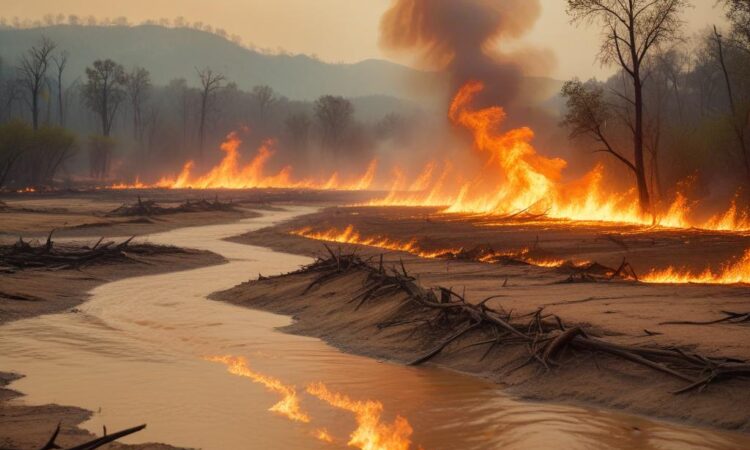Climate Change Fuels Extreme Weather Events
Across the globe, an alarming trend is unfolding: the intensity and frequency of extreme weather events are on the rise. From record-breaking heatwaves scorching continents to prolonged droughts parching landscapes and devastating wildfires consuming vast swaths of forests, the fingerprints of climate change are becoming increasingly evident. These events are not isolated incidents but rather a stark warning of the consequences of unchecked greenhouse gas emissions, raising profound questions about the future of human civilization.
Heatwaves: A Global Phenomenon
The Earth is experiencing a fever, with heatwaves becoming more frequent and intense. This summer alone, regions across the Northern Hemisphere have been subjected to unrelenting heat, with temperatures soaring to unprecedented levels. In Europe, cities like Paris and London have recorded their highest temperatures ever, while parts of the United States have experienced a sweltering heatwave that has stretched for weeks. These extreme temperatures pose serious risks to public health, leading to heatstroke, dehydration, and respiratory problems, particularly among vulnerable populations, such as the elderly and those with pre-existing conditions.
The impacts of heatwaves extend beyond human health. Agriculture, a sector heavily reliant on stable weather patterns, is facing significant challenges. Crops wither under the scorching sun, livestock struggle to survive in the intense heat, and water resources dwindle, threatening food security for millions around the world. The prolonged heat also exacerbates the risk of wildfires, as dry vegetation becomes highly flammable.
Droughts: A Silent Crisis
While heatwaves grab headlines with their immediate impacts, droughts often unfold more slowly, their effects rippling through ecosystems and societies over extended periods. This year, several regions across the globe have been gripped by severe droughts, with water resources dwindling and landscapes turning parched. In the American Southwest, the ongoing drought has pushed water levels in Lake Mead, the largest reservoir in the United States, to record lows, raising concerns about the future of water supply for millions of people.
In parts of Africa, the situation is particularly dire. Persistent droughts have led to widespread crop failures, livestock deaths, and displacement of communities, exacerbating existing food insecurity and pushing vulnerable populations into a state of crisis. The drought conditions are also fueling conflict over dwindling resources, further destabilizing already fragile regions.
Wildfires: Out of Control
The combination of dry conditions, high temperatures, and strong winds has created a perfect storm for wildfires. In recent years, wildfires have become increasingly destructive, consuming vast areas of forest, destroying homes and businesses, and displacing communities. The smoke and particulate matter released from wildfires have serious health consequences, contributing to respiratory problems and air pollution.
The frequency and intensity of wildfires are directly linked to climate change. Rising temperatures dry out vegetation, making it more susceptible to ignition, while changes in precipitation patterns create longer and more intense fire seasons. These factors, combined with human activity, such as arson and land management practices, have created an environment ripe for catastrophic wildfires.
The Urgency of Climate Action
The increasing frequency and intensity of extreme weather events are a stark reminder of the urgent need for climate action. Scientists have been sounding the alarm for decades, warning of the consequences of unchecked greenhouse gas emissions. The events we are witnessing today are not just a matter of abstract scientific projections but a tangible reality that is impacting lives and livelihoods around the world.
The time for debate and delay has passed. The world needs to act decisively to reduce greenhouse gas emissions and mitigate the worst effects of climate change. This requires a global effort, with governments, businesses, and individuals all playing a role.
A Call for Collective Action
Tackling climate change requires a collective effort. Governments must implement policies that incentivize clean energy, reduce emissions, and invest in adaptation measures. Businesses need to adopt sustainable practices, reduce their carbon footprint, and develop innovative solutions to address climate change. Individuals can make a difference by reducing their energy consumption, adopting sustainable lifestyles, and advocating for climate action.
The future of human civilization is at stake. The extreme weather events we are experiencing today are a preview of what is to come if we fail to act decisively. We have the knowledge, the technology, and the resources to address climate change. What we lack is the collective will to act. The time for inaction is over. The time for climate action is now.
A Hopeful Future
Despite the dire consequences of climate change, there is hope. The world is increasingly recognizing the urgency of climate action, and there are growing signs of progress. Renewable energy sources are becoming more affordable and accessible, technological innovations are offering new solutions to reduce emissions, and global cooperation is building momentum.
The challenge is immense, but so is the opportunity to build a more sustainable future. By working together, we can mitigate the worst impacts of climate change and create a world that is cleaner, healthier, and more resilient. The time for action is now. Let us rise to the challenge and ensure a future where humanity and nature can thrive.

